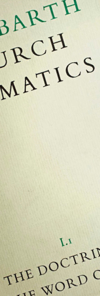Theology follows the talk of the church to the extent that in its question as to the correctness of the utterance it does not measure it by an alien standard but by its own source and object.
Karl Barth, Church Dogmatics I/1, p.4
My previous post said that, for Barth, God is the ‘source and object’ against which theology measures the church. It also said, however, that the subject matter of theology is the church insofar as the church speaks of God, or God only as the one who is spoken of in the church. I can imagine that this sounds as though what I am giving with one hand, I am taking away with the other.
Yet what I have said does not yet tell us anything (either positive or negative) about the kind of objectivity, over against the church, possessed by this ‘source and object’ that the church points to. The answer to that question depends on what the church points to, and on the way in which it points. Looking to the church’s action, and to the forms of confession, acknowledgement and obedience that it pursues, is the proper way to get a handle on this question of objectivity.
I’m pretty sure that we’ll be coming back to this point when we start looking at the place of Scripture in all this – but let me just draw one corollary from what I have just said. Nothing of what I have said so far tells us what kind of objectivity over against the church, as source and norm, Scripture has. Let me labour the point: the answer to that question about objectivity depends on what the church is pointing to when it points to scripture, and on the way in which the church points. Looking to the church’s action, and to the forms of confession, acknowledgement and obedience it pursues, is the proper way to approach this question of scripture’s objectivity. Where else would one stand in order to answer it?
Just as it is a false opposition to think one must say either that theology is about God or that it is about the church, so it is a false opposition to think that one is either serious about the objectivity of the standard against which the church should be measured or focused on the practices of self-criticism by which the church measures itself.
This post is part of a series on the opening of Karl Barth’s Church Dogmatics I/1.


Recent Comments